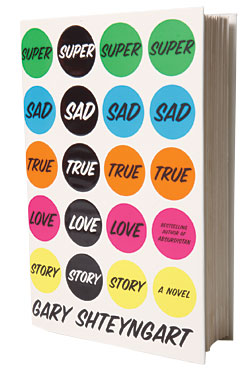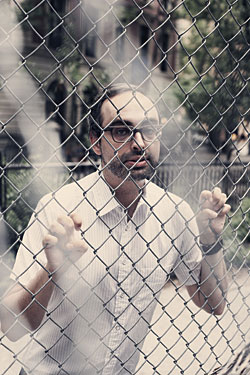
Reports of Gary Shteyngart’s hairiness have been greatly exaggerated.
The first and best Russian-immigrant novelist out of the gate in his generation, Shteyngart has long perpetuated those ugly rumors. During interviews plugging his sprawling 2002 comic debut, The Russian Debutante’s Handbook (which he now insists on calling “The Russian Debutante’s Handjob”) and its messier follow-up, Absurdistan, he said he’d grown up “small, furry, and poor” in Little Neck, Queens. In both profiles and fiction, he created a mythically sad upbringing to which he credited both his sense of humor and his flagrant displays of self-hatred.
The truth about the hair, and the self-loathing, emerges at Spa Castle, a hard-to-reach five-story Korean spa emporium in College Point, Queens. Creepily modern and intensely relaxing, the destination has a few tenuous connections to his third book, a dystopian satire called Super Sad True Love Story. But the main reason we’ve come here to soak, sizzle, and float in saunas and whirlpools is that Shteyngart himself suggested it, in the following e-mail, reprinted in full: “we go to korean bathhouse in queens and catch new social disease …”
In its brevity and innovative syntax, the missive resembles the GlobalTeens (think Facebook) messages that make up much of Shteyngart’s new novel, set circa 2018. The chats are at once bewildering and frighteningly familiar: Twentysomethings spend their days typing about their personal problems (like a repulsive furry Russian boyfriend); or rating the fuckability of high-net-worth individuals (HNWIs); or trying to keep their credit (displayed on sidewalk “credit poles”) high enough to avoid the authorities; or surfing on their all-knowing äppärät devices to drop some serious yuan-pegged dollars on this year’s fashion craze (translucent Onionskin jeans from JuicyPussy).
The repulsive Russian in question is a Shteyngart stand-in named Lenny Abramov, the lone character in Super Sad who sounds familiar from his other books. There is also, of course, the outrageous humor with which Shteyngart skewered nineties American expats in Handbook and the post-Soviet world in Absurdistan. But this time, the object of derision is the United States of America, and New York comes in for some summer-blockbuster-worthy destruction. (Even worse, the hipsters have moved to Staten Island.) It’s a world spinning completely out of control. The only thing keeping the book from doing so as well is the love story at its heart—between Lenny and a young wisp of a girl named Eunice Park.
Love, it turns out, is doing much the same for the author. While changing in the spa’s locker room, Shteyngart gets a message on his äppärät, a.k.a. iPhone: He and his Korean-American fiancée have been approved by the board to buy a two-bedroom apartment near Gramercy Park. Like Lenny, Shteyngart has for years inhabited a 740-square-foot apartment in the sprawling middle-income Co-op Village complex on Grand Street—when he hasn’t been making epic global journeys for his books or his Travel & Leisure features. No longer.
“I’ve been roaming around the world so long, and I wanted something peaceful,” he says. “I’m 38, and I feel like everything’s been so saturated.”
What he’d really like to do is move to the country for half the year. “Anything north of Rhinebeck is okay with me. Even an acre’s fine.” He adds, with a dramatic sigh, “I dream of dacha. Upstate, looking out the window, just trees.” He pictures himself writing in bed, as he usually did on Grand Street. “And I’ve got a long-haired dachshund by my feet. That’s got to be better than Tolstoy ever had. Because he had that wife.”
“Nuclear holocaust—my favorite kind of holocaust,” Shteyngart says during our lunch break, digging into a salad-bar smorgasbord at Spa Castle’s cafeteria. Barefoot Uzbek couples dressed in gender-specific uniforms look (as we do) like extras from Logan’s Run, especially as they pay for their food with I.D. bracelets that resemble Swatch watches. For years, Shteyngart has been gearing up to attack science fiction. It’s an obsession that began at his Conservative Jewish grammar school, where the ostracized young immigrant escaped by reading the short stories in Isaac Asimov’s Science Fiction Magazine, and which persisted despite his middling performance at science-driven Stuyvesant High School. In those stories, “set amid all the depressing crap, there was always some love story, and to me that would always be so interesting. I guess I went whole hog with that idea.”
But even as a neophyte attending Hunter’s M.F.A. program, Shteyngart sensed that sci-fi was not an ideal genre for a first novel. “There’s no way to force this on an unforgiving public, unless you want to be pigeonholed forever as the speculative-fiction guy.” Besides, he believes that he wasn’t ready: “Absurdistan just rolled off the assembly line. This book was hard work.” With it will come, he hopes, greater rewards. “[With Absurdistan], people would just say, ‘Oh, it’s like a literary Borat.’ This cuts closer to the bone, and it should.”

It’s still leavened with a thousand punch lines, though. “I’m never taking the humor out,” he says. “That would be idiotic. That’s my multiple-warhead delivery system”—a way of mitigating the rather depressing ideas he sums up (several times throughout our day) with a timeless quote from Tony Soprano: “Things are trending downward these days.”
Shteyngart likes to speak all his characters’ dialogue aloud before committing it to the page—fitting for a novelist who proudly declares himself “a performer.” During a shvitz in one of Spa Castle’s cooler saunas (he refuses to enter the ones that top 150 degrees), Shteyngart fondly recalls taking an acting class taught by Louise Lasser, Woody Allen’s early co-star and, briefly, second wife. “She would always yell at me, ‘You’re so fake and manipulative.’ And I always thought, ‘It’s true! I live in New York—how am I supposed to survive?’ She said, ‘You’re probably like this in real life, too.’ I love Louise.”
There is a common knock against Shteyngart: He’s a mascot playing off Russian and Jewish stereotypes. Here he is, posing with a bear on a leash on the back of Handbook; there he is, in a promotional video for the new book—co-starring Mary Gaitskill, Edmund White, and former student James Franco—playing an illiterate peasant pretending to be a writer, or possibly a ’shrooms casualty pretending to be an illiterate peasant pretending to be a writer. It’s funny, needless to say, even if it’s undeniably shticky. “Sure, well, it is a shtick,” he says. “I believe in entertainment—I love entertainment. I am authentically me. And part of it has to do with my 401(k). Every author who straddles cultures is inauthentic in a way.”
“I’m never taking the humor out. That would be idiotic. That’s my multiple-warhead delivery system.”
Chang-Rae Lee, who taught Shteyngart at Hunter and launched his career by sending Handbook to his editor, puts it differently. “He’s not an actor,” Lee says. “I think he’s more like a stand-up guy. He’s sort of baring himself out there.” Or, rather, a version of himself—but isn’t that what all stand-up comics do?
In the current book, Shteyngart has left Eastern Europe far behind. (“Oh, God, I am so sick of Russia,” he says.) In its place is a new subject of loving mockery: the Korean-American. Eunice Park has serious daddy issues, and her mother is a Jesus freak. The food is portrayed in tender detail. Lee is just one of Shteyngart’s many Korean friends, on a list that includes two exes as well as his fiancée. He was one of Super Sad’s first readers, vetting it for ethnic sensitivity. “He’s become one of us,” says Lee. “He knows us in and out—maybe that’s an unfortunate turn of phrase. He has great respect and love, clearly, for Koreans.”
At the outdoor hot tub, Shteyngart happily points out that the ladies joining us are ajumas, using that vaguely derogatory term for middle-aged Korean housewives. “I love ajumas—soooo cute!” Later, Shteyngart will insist on going to You-Chun, an outpost of authentic Korean cuisine well beyond the 7 train. He’ll chat up the waitress in Korean, explain that a certain dish is “the healthiest of the dumpling family,” and find it impossible to get his mind off what he’s eating. When I ask him whether the book was cut significantly, he thinks I’m talking about the hand-cut cold noodles.
Shteyngart admits that he feels closer to other immigrants than to Russians or Jews. When he went to Stuyvesant, “I discovered this world of immigrants who were also striving like me, and who also came from funny places.” Korea, where he went for a month with his fiancée, almost feels like home. “It’s one of the most stressful societies in the world,” he says. “Korea’s a lot of fun, but it doesn’t seem like a happy nation.”
Back at the color-therapy sauna, which offers a choice of six hues under which to sweat, Shteyngart peruses the options. Blue relieves anxiety: “I’d like that.” Yellow promotes creativity: “Don’t need it.” And violet “Creates Hope and Encouragement.” “Yes, yes! I need hope! Let’s go get some hope!”
“Dear diary,” Lenny Abramov writes on the first page of Super Sad True Love Story, “Today I’ve made a major decision: I am never going to die.” Lenny is the Life Lovers Outreach Coordinator of the Post-Human Services Division of the Staatling-Wapachung Corporation, and if he can save up the cash, he’d have easy access to his employer’s state-of-the-art life-extension technology.
It’s no accident that Lenny falls for a woman ten years his junior. “How do we live forever?” Shteyngart asks. One way, for men, is “by dating younger women.” He has certainly done so in the past, “but I don’t love youth as much as I used to.”
What concerns him more is death—something he says he’s been obsessed with since the age of 1. “My life expectancy could be around 60,” he says, citing little more than sky-high cholesterol as evidence. “When my doctors look at my chart, they say, ‘There’s no hope here, just die.’ It’s about harm reduction, which means I eat meat only when it’s exceptional.” He says this while discarding a tough piece of beef that’s inflamed a dental filling.
Super Sad can easily be mistaken for the work of a crank, middle-aged before his time, and Shteyngart, with his talk of dachas and death, does little to dispel the impression. But he’s as distractible as any iPhone user (constantly taking pictures: “I love Chinese Snoopy,” he says, snapping a Chinese bank ad featuring the cartoon pooch) and even writes his own Facebook page (“okay, i hate food porn as much as the next person, but this photo of my favorite bone marrow appetizer at l’express on rue st-denis takes me back … mwah! i love you, bone marrow”). Twitter, though, is an app too far: “After that, you’re more machine than man.”
Nonetheless, a deep, anticipatory nostalgia for books does infuse the novel. “I can’t believe that writing used to be one of the main sources of entertainment,” he says. “Who knows, maybe literature will come back some day. It just sucks to be in the butthole of it all of a sudden—it sucks for me personally.”
But then something seems to dawn on the author recently chosen as one of The New Yorker’s twenty best writers under 40, who’s sold hundreds of thousands of books, who teaches fiction at Columbia, who takes cabs everywhere, who will soon live near Gramercy Park and can reasonably contemplate a country house. Or maybe that violet color-therapy sauna actually works. “I’m very lucky—I’m one of the five or ten luckiest people of my generation when it comes to this job … I don’t know if anyone will be reading literature at all in the next twenty years, but I’ve got some good ideas. I’m hopeful! See, here’s the thing. This is so Soviet of me. I believe in myself as an individual. I’m just worried about the whole shebang.”
Super Sad True Love Story: A Novel
By Gary Shteyngart.
Random House. July 27. $26.
